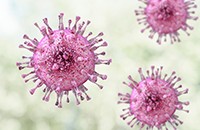
About Sexually Transmitted Diseases (STDs)
Sexually transmitted diseases are contagious bacteria, viruses, fungus or parasites that are spread through intimate person-to-person contact, such as heavy petting, and oral, vaginal and anal sex.
Sometimes referred to as sexually transmitted infections (STIs), these diseases are not transmitted through day-to-day contact in social settings such as schools or at the workplace, nor are they transmitted through casual contact -- including kissing, shaking hands or hugging. Dirty toilet seats, mosquitoes, eating utensils and drinking glasses pose no risks of transmission.

STD infections, left untreated, can spread to other areas of the body, causing serious medical conditions such as crippling arthritis, blindness, heart attack and death.
By targeting the identification and treatment of STDs in Tarrant County, Public Health helps reduce their transmission.

Two Types of STDs

Bacterial infections --such as with gonorrhea, chlamydia, syphilis and several others-- are usually curable with antibiotics, requiring only one clinic visit.

Virual infections -- such as herpes, genital warts or HIV/AIDS -- cannot be cured but can be controlled and managed over time. A regimen of medications and multiple clinic visits may be required.
Symptoms of an STD infection
- STDs do not always cause symptoms, so it is possible to have an infection and not know it.
- If there are symptoms, those might include vaginal discharge, penile discharge, and ulcers on or around the genitals and pelvic pain.
- Sometimes STIs cause symptoms with the other person one has had sex with. In many instances the symptoms are very slight and may not be noticed, or there are no signs or symptoms.
- Any infected person --with or without symptoms-- places their health at risk, and risks the possibility of infecting any person with whom they have sexual contact.
Waiting for signs of an infection before testing can be a costly and sometimes fatal.
STDs are a serious health concern and can threaten the community
- STD infections that are left untreated can spread to other areas of the body, causing serious medical conditions such as crippling arthritis, blindness, heart attack and death.
- An infected person who continues having sex with other partners risks infecting them. They, in turn, may infect any other partners they may have sex with -- further spreading the disease.
- When a pregnant woman with an STD infection is untreated, her unborn infant is at risk for serious health problems --including death.
- When someone develops an STD infection, they are also at a high risk of acquiring Human Immunodeficiency Virus (HIV), which is a virus that attacks a person's immune system. Conversely, when an HIV-infected person is also infected with another STD, they are much more likely to transmit HIV than someone who is only HIV-infected.
more about HIV
Testing and Treatment of STIs/STDs
- There are dozens of STDs.
- Getting tested helps determine the type of STD present and what treatment may be needed.
- Getting tested also gives you the knowledge to help put you in charge of your health and help guide you with your personal relationships.
- STD treatment reduces the ability of an HIV-positive individual to transmit HIV.
- Although Tarrant County Public Health does not test for HPV, we will examine and treat genital warts.

STDs On The Rise - report from the National Coalition of STD Directors


 TARRANT COUNTY, TX
TARRANT COUNTY, TX

 Public Health
Public Health